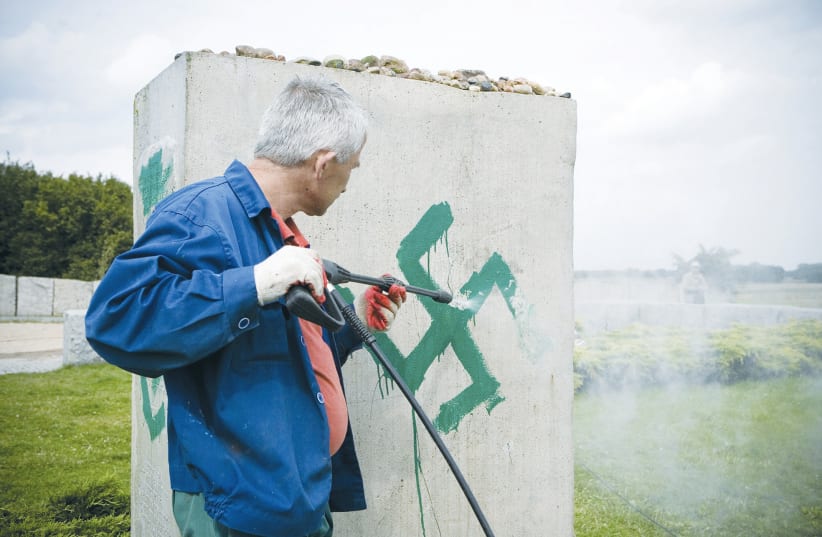Last month in Otwock, a former spa-town southeast of Warsaw, swastikas were painted on the railway station where women and children were loaded onto trains for Treblinka. This might play into the stereotype of an antisemitic Poland, especially after the recent passage of a controversial law that criminalizes blaming Poland or Polish people for harming Jews has been applied to harass journalists and Holocaust historians.
The danger of outrage toward Poland for hate crimes and the law passed last month limiting Jewish property restitution and policies that sanitize history is anti-Polish sentiment. But demonizing all Polish people is prejudiced, and diminishes the work of school-teachers, community leaders and activists who for years have cleaned up Jewish cemeteries, welcomed returning survivors and their descendants, organized memory marches, and now tell the difficult stories of families who once lived in their towns and owned homes they now live in.
While ADL surveys indicate 48% of Poles agree with antisemitic stereotypes, had they met any Jewish people, they might have responded differently. But most haven’t. Of the 3.3 million Jews living in Poland before the war, today there are around 10,000 – only one in Otwock of 14,000.
As the great-great-granddaughter of the doctor who established Otwock’s first Jewish sanatorium, later one of Poland’s top tuberculosis treatment centers, I felt conflicted the first time I visited Poland. My grandmother told me how before the war, at university, they forced her husband to sit in a separate part of the lecture hall. There were pogroms and antisemitic riots.
My grandfather couldn’t practice law after he graduated because he was Jewish. But my other grandfather told me how during the war, Otwock resident Irena Sendler rescued around 2,500 Jewish children. His friend helped him obtain false papers and a house to hide in so he could smuggle my mother out of the Warsaw Ghetto. When I first visited Otwock, people welcomed me. They asked difficult questions about my family. They listened.
Poland’s government has censored museums and historians to present a glorified view of Polish behavior during Germany’s brutal occupation in which nearly five million Polish citizens were killed, three million of them Jewish. Highlighting thousands of Polish citizens who risked their lives to help Jews like my mother while ignoring those who betrayed their neighbors might be easier to live with, but revisionist history bypasses the opportunity to learn from choices we make under monstrous conditions. History is complicated. So is human behavior. After surviving Auschwitz and Ravensbrück, my grandmother believed evil lives inside all of us, and that we’re all capable of treating each other like animals.
The Nazi regime normalized the monstrous. In Otwock and in more than 44,000 ghettos and camps across Europe, they created systems of privilege and forced people into choiceless choices. In Otwock, Calel Perechodnik became a ghetto policeman to avoid a labor camp, to save his and his family’s lives. But in his memoir we learn how after the Germans deceived him, he aided the loading of his wife and daughter onto a train for Treblinka.
Outside the ghettos and camps, some people took property and jewelry from my family, and others then denounced them to the Nazis. But thousands made choices that saved people. My grandfather’s friend smuggled food through brick and wire walls to keep my mother and her family from starving, ignoring the death penalty for helping any Jews.
I have learned if we dig into secrets no one wants to discuss, the truth can be ugly. History is not black or white. The line between guilty and blameless is not always clear.
Choices our parents and grandparents made create a legacy that influences our identities. My mother was hidden by Catholic sisters for part of the war and raised me Christian. My grandmother once convinced a Nazi SS officer who tortured women to save my mother.
Last month, before I marched with townspeople to remember 8,000 murdered Jewish citizens, Otwock’s residents painted over those swastikas at the railway station, just as two years ago, a priest and locals removed swastikas from the memorial stone in the forest that marks a mass grave where 2,000 Jews were shot. At the railway station they pasted a sign over one: “The inhabitants of Otwock, Poland, and a large part of the world were murdered under the symbol of the swastika. Just think about it. Don’t propagate evil!”
Without the kindness of Polish friends and strangers, my mother would not have survived. At a time when leaders around the globe are whitewashing and rewriting history, it is critical that we don’t judge and condemn all people living in those communities. Diluting grass-root efforts to unearth painful stories prevents us and future generations from learning and moving past the horrors of history and breaking the cycles of hate.
A former Internet executive and now a Holocaust educator, Karen Kirsten is an Australian-American who speaks around the world on the topics of hatred and reconciliation.
